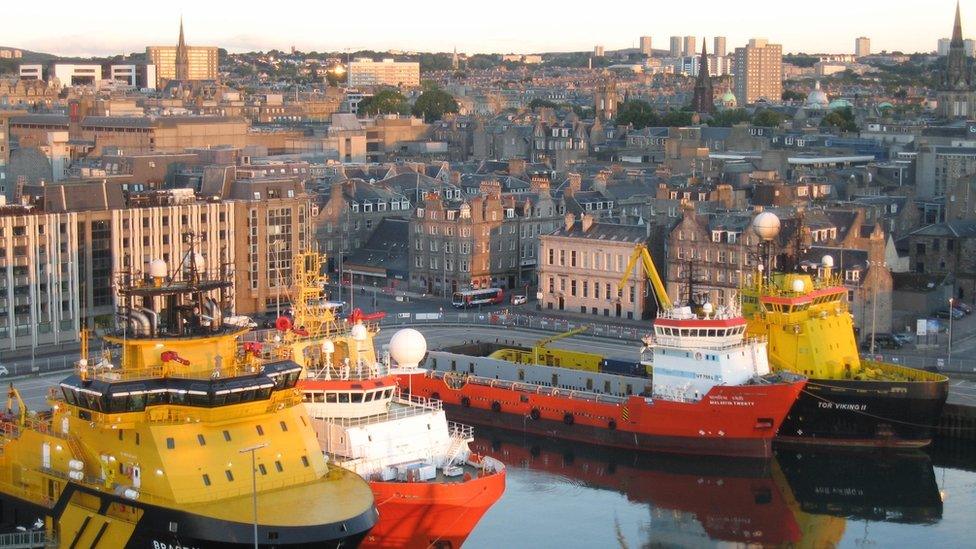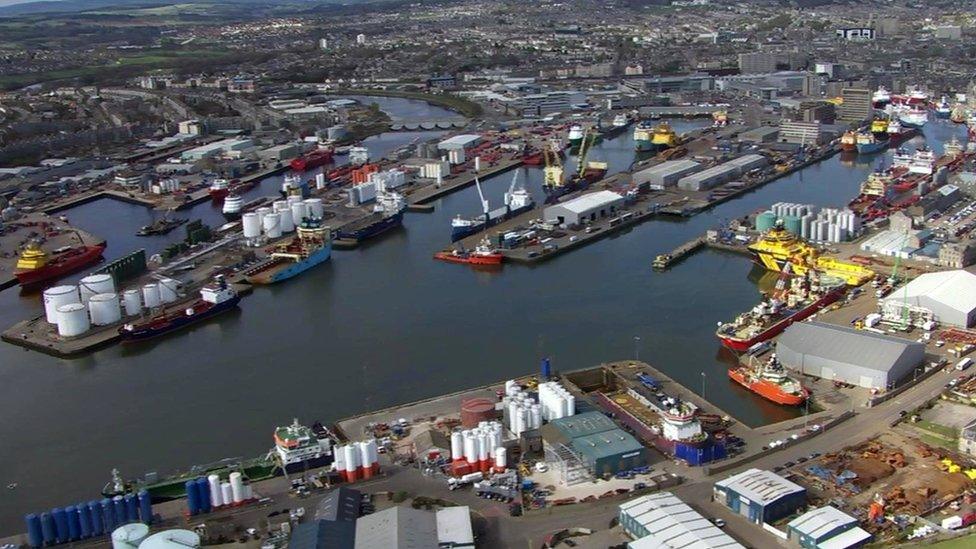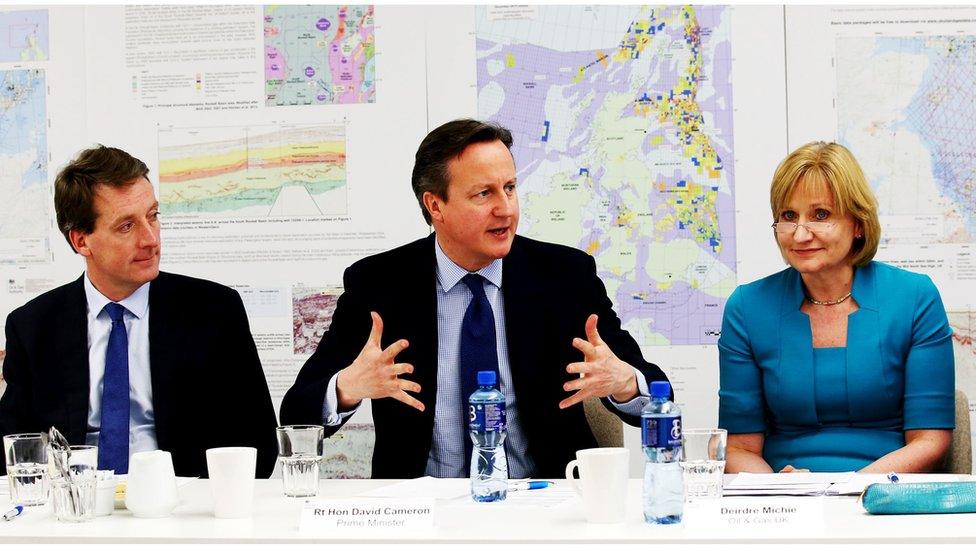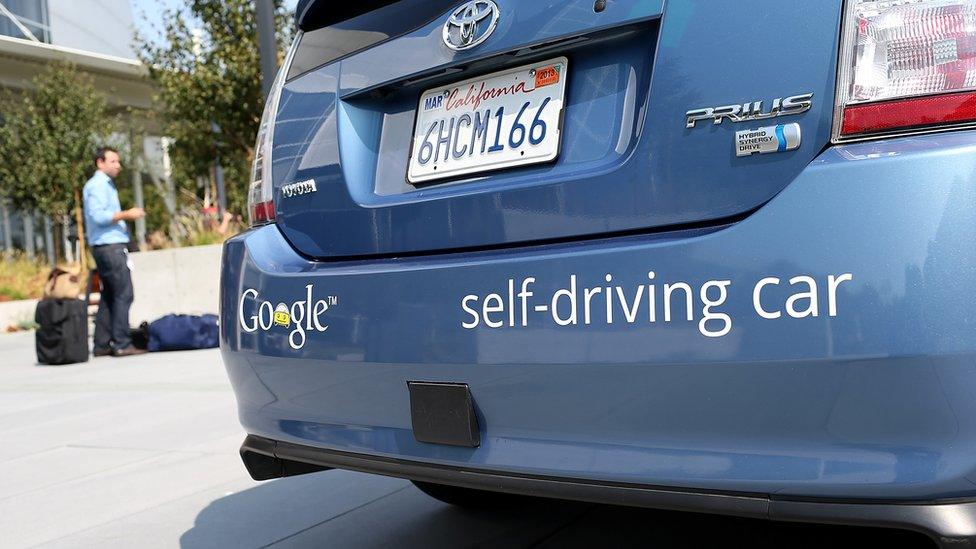City Deal or no deal?
- Published

Aberdeen's been getting love bombed with political tourists, though true to stereotype, Aberdonians would prefer if the affection were expressed in financial terms.
Both Scottish and UK governments have been accused of being slow off the mark in responding to the oil downturn and its impact on the city.
But this week, and next, they're visiting, listening, talking, and splashing some cash.
"Not enough cash", is the response from several figures in the north-east. The UK government has found £125m to help out. This is being contrasted with the £300bn or so that the offshore industry has sent the Treasury over the past 40 years.
The more charitable responses to the initiative have emphasised that this is a starting point rather than a game-changer for the north-east.
And Aberdonians - oil industry grandee Sir Ian Wood included - reckon they've been short-changed for years by the allocation of council funds from St Andrew's House in Edinburgh.
The weighting towards those with the strongest indicators of deprivation has long seen the north-east on the rough end of the deal.
Sir Ian also hinted heavily that there are further moves afoot at Westminster for further cuts in tax on the oil industry, most likely to feature an exploration drilling allowance.
The Scottish government matched the Treasury's funding last week, and added more. Nicola Sturgeon wasn't going to get caught out, as ministers were last time a Scottish city deal was being struck.
That was for Glasgow and surrounding council areas in 2014, when UK ministers surprised St Andrew's House with an announcement that required a rapid decision on a £500m commitment over 20 years. It was politically impossible to say 'no'.

Some within the oil industry believe the sector could see get tax breaks to help the north east weather the storm of low oil prices
This was Whitehall saying it could reach beyond Holyrood to influence policy at a more local level, and because it involved large amounts of money, it was hard to take issue with that.
But this deal is not about a city. The two examples in Scotland, so far, are not about cities, but regions - the north-east, and the Clyde Valley - and they look like an odd sort of a deal.
The main thrust of this policy is aimed at cities in England, where the basis of it is very different.
There are three key elements to the English version. The one in common with Scotland is that it involves a wad of money from the Treasury, spread over 20 years or so, and almost all for capital spending.
In the case of Clydeside, the intention is to use £1.1bn to lever in twice as much in private sector investment, with the forecast of "delivering" 29,000 jobs.
Piecemeal
Then, down south, the deal is about cutting down on Whitehall bureaucracy. By creating a city deal unit at the heart of government, it knocks heads together across spending departments, which otherwise tend not to co-ordinate their regional thinking that cleverly.
With smaller government in Scotland, where it is often claimed that you can fit all the people who matter on a decision into a reasonably small room, that is less of an issue.
The English city deal also involves a significant devolution of power over spending, some with the condition that the cities shift to a stronger, mayor-led executive form of government. It is an important part of the so-called Northern Powerhouse policy, of re-balancing the English economy away from the south-east.

David Cameron announced the City Deal funding during a visit to Aberdeen
Most deals are also conditional on local councils working more closely together.
This is piecemeal devolution, where England's regions have previously resisted taking on more political control. It may also help fill the gap left when regional development agencies were killed off five years ago.
Instead of defining England as a patchwork of regions, to which loyalties are usually weak or at least ambivalent, devolution is being based around the strengthening of cities as economic and government hubs, with Manchester taking the lead, and even taking on some central health spending.
It fits with a common view, around the world, that the city is the economic dynamo rather than the region or the country.
Historic concordat
In Scotland, then, the City Deals (or city region deals) seem to be almost entirely about the money rather than significant changes in the way government works and power is distributed.
There is an intention to get councils working more closely together, to reduce the inefficiencies of departmental duplication across boundaries. But we've been hearing that one for a while, and there's been slow progress.
It is not going to be helped by the strong feelings and angry words from councils around the coming year's budget cuts to grants from Holyrood.
Whereas, eight years ago, there was much talk of "the historic concordat with local councils", with the new SNP government giving them more power over their spending priorities, now it feels more like tensions of historic significance.
If city/region deals are to be extended to Edinburgh and south-east Scotland and then Inverness and the Highlands, it may give some momentum to more joint working between councils.
But if those are approved as well, this becomes a policy that is no longer about areas in most need of help, and becomes more generalised. The initiative would also cover so much of the country that there is a risk to those left without a deal - south-west Scotland, for instance, or Tayside.
One criticism is that the deals lack imagination. On Clydeside and in the north-east, they have seen councils take old plans down off the dusty shelves.

A recent report suggested city investment should look to smart infrastructure solutions including driverless cars
A Glasgow airport rail link and improvements to Aberdeen harbour are desirable, no doubt, but critics suggest this is an opportunity to re-think the way the cities work, to make use of new technologies to make them smarter, and the opportunity is being wasted.
The Scottish Council Development and Industry (SCDI) recently published a blueprint for the Scottish economy, suggesting that capital spending by directed to infrastructure which is 'transformational'.
That would put more emphasis on a digital future - not only with better broadband, but investment in smart technologies to make cities work better and with less energy use, and in the skills for its citizens to make the best use of that.
'From Fragile to Agile' , externalsuggests that transport infrastructure needs to look to a future with self-driving cars leading to less car ownership and more sharing, so less congestion.
That has the "potential to release road capacity to re-engineer city centres to be economically vibrant and release land for large-scale redevelopment".
So these deals could offer opportunities to re-think the way cities work, rather than respond to the next pressure point with incremental conventional infrastructure.
And in England, they are being used as an opportunity to re-distribute powers.
In Scotland, that question of central versus local power is likely to be a significant factor in the Holyrood election campaign, as well as next year's national vote for councillors.